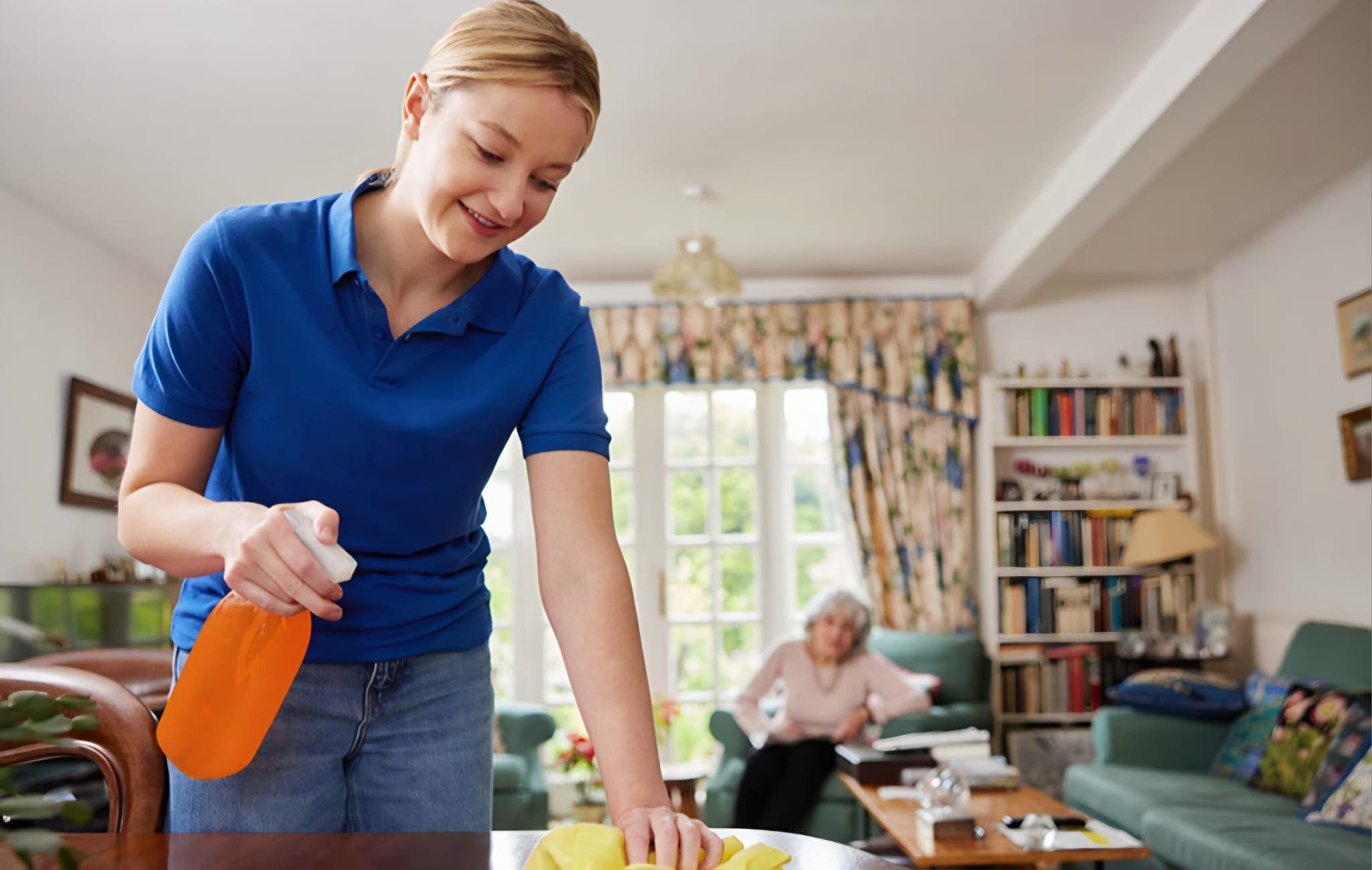
How a Caregiver-Based Cleaning Service Creates a Safe Space for Seniors
January 5th, 2026Caregiver job, Caregiver Service, Caregiver Services, caregiver support, caregivers, Cleaning Services, Companion Caregiver,
Highlights
- A caregiver-based cleaning service combines professional cleaning with care.
- These services focus on safety, comfort, health, and dignity, not just cleaning tasks.
- Clean and clutter-free homes help seniors reduce fall risks and avoid common household accidents.
- Caregivers identify and remove hazards like loose rugs, spills, poor lighting, and cluttered walkways.
- Proper cleaning helps seniors save their energy for important daily activities like cooking, walking, and socializing.
- Bathrooms and kitchens receive special care since they are high-risk areas for slips and falls.
- Gentle, senior-safe cleaning products are used to prevent breathing issues and skin irritation.
A clean-living space is essential for everyone, especially seniors and individuals with disabilities. For many seniors and physically disabled people, home is where all their best memories live. However, handling a busy routine, offering effective support for the senior member, and cleaning the home may not be possible for everyone, but it is essential.
That’s why caregiver-based cleaning services in Farmington, CT, have become popular. The experts not only clean homes but also offer effective care and support for seniors and people with disabilities. It builds a bridge between a clean house and a healthy, happy life.
In this blog, we will dive deep to explore how these services work, why they are so helpful for seniors and people with disabilities, and how they create a safe space.
What is a Caregiver-Based Cleaning Service?
Our janitor cleaning service is much different from traditional cleaning services. Regular cleaners dust, scrub, and vacuum. They move fast and leave quickly. But the story is not the same with caregiver-based cleaning services. It is a combination of home care and housekeeping. It ensures the environment is spotless and the person living there is safe and respected. Our expert caregivers don’t just see a messy kitchen; they see a senior or a physically disabled individual who may be struggling to reach the top shelf.
The primary goal of our caregiver-based cleaning services is to offer perfect care to seniors and create a safe space for them.
Why a Safe Home Matters for Seniors
A clean & safe home is most essential for them. As people age, they may face issues, such as poor balance, weak muscles, vision problems, and health conditions. Even spills or clutter can lead to serious falls. They also suffer from breathing problems due to excessive dust in the living room. A clean room helps seniors stay independent longer, feel relaxed and confident, avoid injuries and illness, and enjoy daily life more.
The Role of Caregiver-Based Cleaning Services in Creating a Clean and Supportive Space
- Reducing the Chances of Falls:This is one of the biggest worries with seniors and people with wheelchairs. A stray rug, a slippery floor, or clutter in a hallway can lead to an accident. Our caregivers know exactly what to look for. They don’t just clean the floor; they clear the path.
- Managing Energy:If a senior spends all their energy in cleaning a bathroom, they may be too tired to enjoy a healthy meal or go for a walk. By opting for our janitor cleaning services, you can give your loved one extensive care and help them manage their energy throughout the day.
- Prioritizing Health & Hygiene:A dusty home can cause breathing problems, especially for senior members. Germs and bacteria in the kitchen and bathroom can lead to sickness. Our professionals provide a deep cleaning to maintain all the essential spaces healthy and hygienic.
- Making the Individual Comfortable:We are not limited to cleaning the home, and you know it. Our experts provide companionship to the senior members to make them feel comfortable and fight against loneliness. This is highly essential for older individuals.
- Using Gentle & Safe Cleaning Products:Strong chemicals can be harmful to seniors. A caregiver-based cleaning service often uses gentle, safe products. Our experts use solutions that lead to less breathing trouble, no strong smells, and safer surfaces.
What to Expect from Professional Caregiver-Based Cleaning Services?
If you have any doubts about our janitor cleaning service, no need to go anywhere. Here’s what you can expect:
- Decluttering Spaces:Our expert caregivers help declutter the spaces that your loved one uses the most. If many items aren’t in use anymore, our professionals set them aside and organize them strategically so the senior member doesn’t face any problems.
- Cleaning High-Traffic Areas:The bathroom and kitchen are the most used rooms in a house. They are most dangerous for seniors and individuals with limitations because of water and spills. Our experts ensure that the mats are non-slip and secure. They also remove spills and grab bars for safety.
- Lighting the Way:As people age, they face the most difficulties in walking. Our expert caregivers check if light bulbs are burnt out or if a lamp cord is stretched across a walkway where someone could trip. This will help ensure safety for your loved one.
How It Helps the Family
If you are a son or a grandchild of a senior, you probably worry about them. You want to keep the living spaces clean, but you also want to spend your visits not working. When a family hires a caregiver-based cleaning service, it takes the pressure off everyone.
- Quality Time:Instead of spending your Saturday scrubbing your grandmother’s floors, you can spend it looking at old photos or going to the park with her.
- Peace of Mind:You can sleep better knowing that a professional has checked the house for hazards and that your loved one is in a clean, healthy environment.
How a Caregiver-Based Cleaning Service Provides Emotional Support to Seniors
Caregiver-based cleaning services are not limited to cleaning spaces; we offer much more than ordinary cleaning:
- Engaging in Friendly Conversations:Our expert caregivers not only clean surfaces but also engage in friendly conversations. They make sure the senior person feels comfortable. They also provide perfect companionship to your loved one so they cannot deal with loneliness. Having someone to look forward to seeing can change a senior’s entire mood for the week.
- Reducing Stress & Anxiety:Have you ever felt nervous when your room is a mess? For seniors, a messy house can feel even more overwhelming. Knowing that the laundry is done and the dishes are clean helps a senior relax. Seniors often worry about things they can no longer do. When a caregiver handles the cleaning, that worry disappears, leaving the senior feeling light and happy.
- Boosting Confidence & Dignity:It can be hard for seniors to admit they need help. A caregiver-based cleaning service handles this with a lot of respect. When the house is clean, seniors feel proud to invite friends or family over. This helps them stay social instead of hiding away because they are embarrassed by a mess.
- Creating a Sense of Routine:For many people, especially those who may have trouble remembering things, a routine is very comforting. Knowing that “Tuesday is cleaning day” gives seniors something to count on. This structure helps reduce confusion and makes the world feel like a safer place.
- Acting as a Safety Net:Because our cleaners are also trained caregivers, they notice small changes that a regular cleaner might miss. They may see that a senior isn’t eating as much or seems more tired than usual. When you know a caring professional is checking in, you feel less stressed, too. That calm feeling often rubs off on the senior!
Caregiver Training & Safety Standards
As part of our commitment to senior safety and quality care, all caregiver-based cleaning professionals must complete mandatory training before assignment. This ensures every service meets strict safety, hygiene, and care standards.
Access the mandatory training here:
https://polishcareservices.com/training
A caregiver-based cleaning service plays a key role in creating a safe space for seniors. It helps prevent falls, supports good health, reduces stress, and keeps homes comfortable. Most of all, it brings care and kindness into everyday cleaning. If you or your loved one wants to age safely at home, a caregiver-based cleaning service can make that journey easier and brighter.

AI Benefits for the Elderly and Disabled
June 15th, 2023aging in place, Alzheimer's Care, Caregiver Employment, Caregiver job, Caregiver Service, Companion Caregiver, Dementia Care, Elderly Care, Fall Activities for Seniors, Hire CNA, Hire HHA, Hire PCA, Home Healthcare, Homecare, House Cleaning, In Home Care, Long Term Care, Outdoor Activities for Seniors, Polish Care Services, Retirement Plans for Seniors, Senior Care Services, Spring Activities, Summer Activities for Seniors,
Although there is so much consternation and hype, Artificial Intelligence (AI) can benefit the elderly and disabled population in many ways. Some of the benefits include:
- Health monitoring and assistance through wearable devices and smart home systems: AI can be used to monitor the health of elderly individuals through wearable devices and smart home systems. These devices can track vital signs, such as heart rate and blood pressure, and alert caregivers or medical professionals if there are any concerning changes. Smart home systems can also be used to monitor the movements and activities of elderly individuals, providing an additional layer of safety and security.
- Medication management: AI can assist with medication management by providing reminders to take medications, tracking medication usage, and alerting caregivers or medical professionals if there are any missed doses or potential drug interactions.
- Social interaction and companionship: AI can provide social interaction and companionship to elderly individuals through virtual companions, such as chatbots or virtual assistants. These companions can engage in conversation, provide entertainment, and help alleviate feelings of loneliness and isolation.
- Cognitive stimulation and memory support: AI can provide cognitive stimulation and memory support to elderly individuals through games, puzzles, and other activities designed to exercise the brain and improve cognitive function. AI can also assist with memory support by providing reminders for important events or appointments.
- Daily living assistance: AI can assist with daily living tasks, such as meal preparation, housekeeping, and personal care. This can help elderly individuals maintain their independence and continue living in their own homes for longer.
- Increased independence: By providing assistance with daily living tasks, health monitoring, medication management, and other areas, AI can help elderly individuals maintain their independence and continue living in their own homes for longer.
- Lower healthcare costs, better transportation, and longer employment: AI can help lower healthcare costs by improving health monitoring and early detection of potential health issues. AI can also assist with transportation by providing ride-sharing services or autonomous vehicles designed for elderly individuals. Additionally, AI can help extend employment opportunities for elderly individuals by providing job-matching services or remote work opportunities.
- Virtual companions: As mentioned earlier, virtual companions such as chatbots or virtual assistants can provide social interaction and companionship to elderly individuals.
- Anti-aging research: AI can assist with anti-aging research by analyzing large amounts of data to identify potential treatments or preventative measures for age-related diseases.
- At-home health monitoring: As mentioned earlier, AI can assist with at-home health monitoring through wearable devices and smart home systems.
- Smart device-assisted daily living: Smart devices equipped with AI technology can assist with daily living tasks such as turning on lights, adjusting the thermostat, or locking doors.
- Smart device-assisted fall detection: Smart devices equipped with AI technology can detect if an elderly individual has fallen and alert caregivers or medical professionals.
- Improved quality of care: By providing assistance in areas such as health monitoring, medication management, daily living assistance, and more, AI can help improve the overall quality of care for elderly individuals.
AI is also helpful in intelligent tracking of biometric information to early diagnosis of diseases, understanding the treatment pathways, and helping clinicians to take care of elderly and disabled people and treat them more efficiently.
Polish Care Services team provides blogs and news articles that are not only informative and entertaining, but can enhance the wellbeing of seniors and disabled in Connecticut and Sarasota County in Florida
Credit: Bing AI, Google AI, Peter Powell
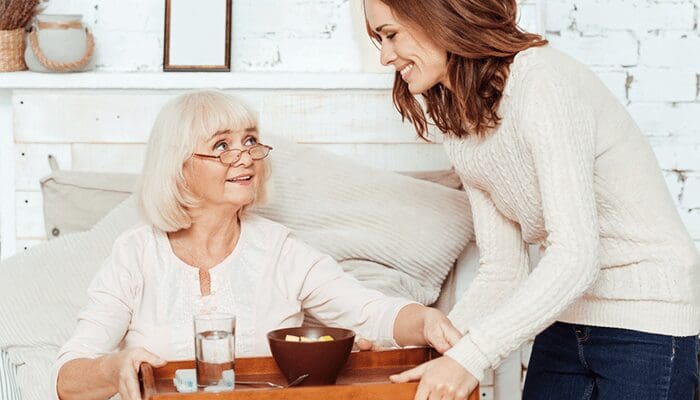
The Benefits of a Caregiver Agency
June 13th, 2023aging in place, Alzheimer's Care, Caregiver Employment, Caregiver job, Caregiver Service, Companion Caregiver, Dementia Care, Elderly Care, Hire CNA, Hire HHA, Hire PCA, Home Healthcare, House Cleaning, In Home Care, Long Term Care, Outdoor Activities for Seniors, Polish Care Services, Retirement Plans for Seniors, Senior Care Services, Spring Activities, Summer Activities for Seniors,
Caregiving is a rewarding but challenging job that requires compassion, patience, and skill. Many people who need assistance with daily living tasks, such as seniors, people with disabilities, or people recovering from illnesses or injuries, prefer to receive care at home rather than in a facility. However, finding and hiring a reliable, qualified, and affordable caregiver can be difficult and time-consuming for families. That is why many families choose to work with a caregiver agency, which can offer many benefits over hiring an independent caregiver.
A caregiver agency is a registered business that employs caregivers and sends them to the home of the care recipient to provide in-home care. The agency can provide medical care or non-medical care, depending on the needs and preferences of the client. The agency also takes care of the administrative aspects of hiring and managing the caregivers, such as background checks, payroll, scheduling, training, and supervision.
Some of the benefits of hiring a caregiver through an agency are:
- Quality: an agency typically will verify caregivers’ credentials, certifications, and experience in addition to performing background checks. An agency will provide continuous training and development to ensure caregivers and office staff are up to date with current skills and practices This ensures that the caregivers are qualified, competent, and up-to-date on the best practices and standards of care.
- Safety: Agencies are responsible for ensuring that the caregivers follow safety protocols when providing care at home. They provide workers compensation and liability insurance for their employees. This protects clients and caregivers in case of accident and work-related injuries.
- Flexibility: Agencies can offer a range of services and schedules to suit the needs and preferences of different clients. They can provide non-medical and other services that may suit the clients needs. Whether it is hourly services, live in assistance, long term or temporary services, The agency will match the caregiver that is considered a best fit for the client based on personality, skills, experience and availability.
- Reliability: Agencies will have a pool of caregivers who is able to cover desired shift or back up assistance in case of emergencies or absences. This means that the client will always have someone to provide care at home without interruption or inconvenience. They can also manage issues or complaints that may arise between the client and the caregivers.
- Support: Agencies can provide additional support and resources for both the client and the family. They can help to coordinate other services or referrals such as medical appointments, social activities, transportation, equipment. They can also provide emotional support and guidance for the client and family members who are involved in caregiving.
In conclusion, hiring a caregiver through an agency can offer many benefits for both the client and the family. It can ensure quality, safety, flexibility, reliability, and support for in-home care. It can also save time and hassle for families who are looking for a trustworthy and affordable caregiver. Therefore, working with an agency can be a smart choice for families who need help with caregiving at home.
Polish Care Services is a Homemaker Companion agency registered in Connecticut and Florida that provides support services for seniors and disabled, whether it is live in services, hourly support, or overnight assistance. The supportive office team works with the client to find a match for their needs and is a constant support for the client and staff throughout the process.
Credit: Madeline Sinatro
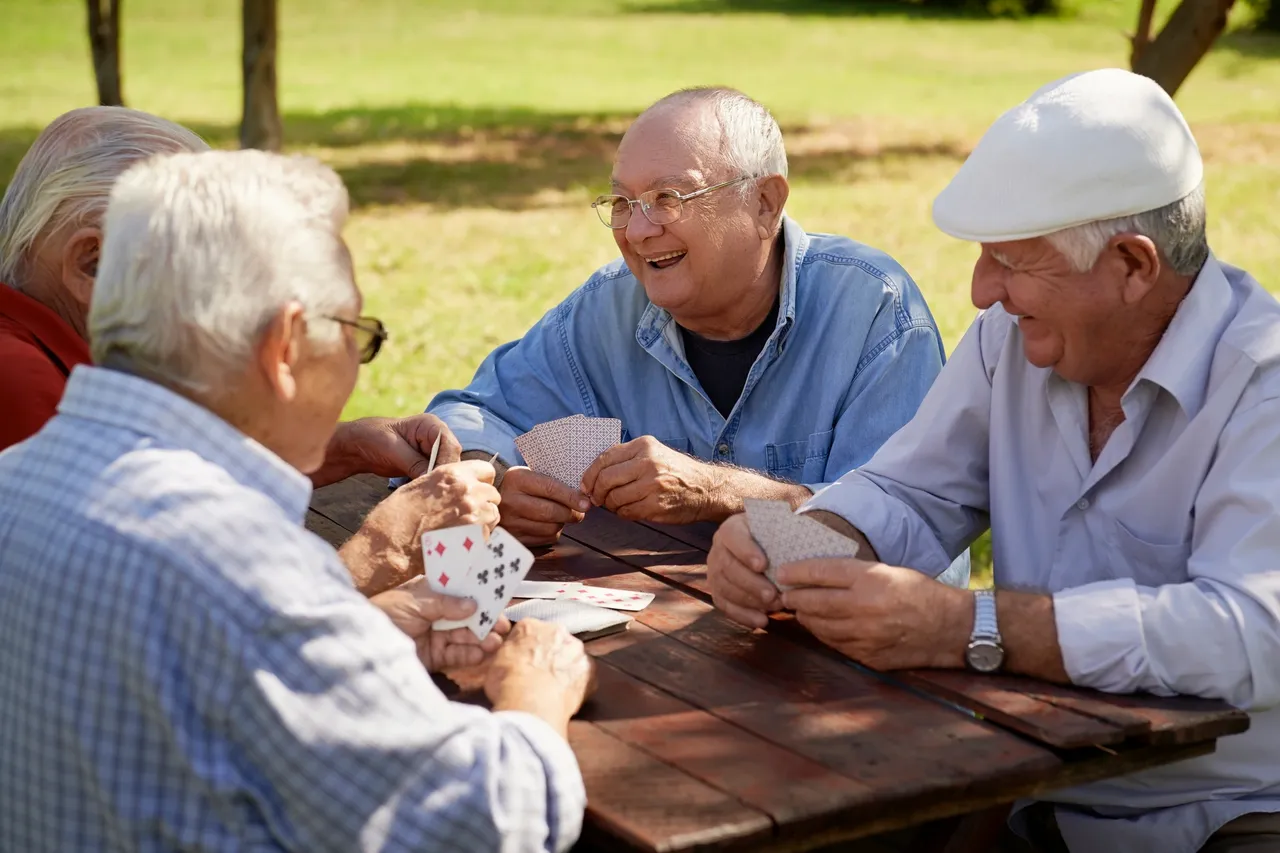
Resources to Help Seniors Who Have Few Relatives Nearby
May 24th, 2023aging in place, Alzheimer's Care, Caregiver Employment, Caregiver job, Caregiver Service, Companion Caregiver, Dementia Care, Elderly Care, Fall Activities for Seniors, Home Healthcare, In Home Care, Long Term Care, Retirement Plans for Seniors, Senior Care Services,
Aging brings many challenges as well as joys. While it’s generally good fortune to have a long life, it’s even better if you have family nearby to offer help and companionship. Sometimes, seniors live far from family, though. In these cases, Polish Care Services suggests you make use of the following resources for managing daily life.
Maintaining a Social Life
Loneliness can be a risk factor for health issues, and we all need companionship. Here are some ideas to help seniors develop and maintain social connections.
- Consider volunteering. After all, seniors can and do contribute an enormous amount by tutoring, mentoring, helping prepare or distribute food to those in need, fundraising, assisting with tax preparation, or working the polls during elections.
- Take a class. Post-retirement is a wonderful time to pursue interests you may not have had time for while working. Whether it’s a non-credit history or language class at the local university, or a dance or crafting class at a community center, you’ll meet others with common interests and get to explore something you enjoy.
- Take a part-time job. Although not everyone is eager to return to the nine to five grind, sometimes working a few hours a week can enhance a senior’s life by providing social connections, as well as the satisfaction of contributing effort to an important cause.
- Join a church, mosque, temple, or other organization that supports your spiritual beliefs. If you’re already a member, look into getting more involved there. It’s a great way to get to know others who share your values.
Health and Wellness
Good health is important to people at every age, and there are always things a person can do to increase their chances of staying well.
- Join an exercise class. The connection between exercise and improved mental health has been documented increasingly over the past decade. Many forms of exercise are appropriate for seniors, ranging from swimming to no impact aerobics and gentle weight training.
- Consider a mind-body practice, such as tai chi, qi gong, yoga, or mindfulness walking. These disciplines can improve cognitive functioning as well balance, strength, range of motions, and stress relief.
- Get an exercise or healthy eating buddy. Having another person counting on you can help with motivation and increase fun, whether you’re cooking a healthy meal together or meeting for a walk.
- Laughter is good medicine. It can increase the release of endorphins, and alter serotonin and dopamine levels in the body. Whether it’s a funny movie, a cartoon in a magazine, a hilarious book, or a podcast, finding reasons to laugh can make life more healthy, as well as more fun. This is yet another activity best done with a buddy.
Financial Assistance is Available
Most people worry to some degree about running out of money, managing money, or calculating and paying taxes in a timely and accurate manner. There are many local, state, and federal programs to help with planning and managing financial concerns.
- Help with the cost of prescriptions can be found via the Extra Help program through Medicare in some states. Other states have their own programs.
- Seniors and all adults may experience stress when faced with financial and other types of decisions.
- The IRS sponsors free tax help clinics for seniors. These can be quite helpful since many seniors have complex situations involving pensions, IRAs, or pre-death insurance benefits. Having free help from an expert can make the challenge of tax preparation less daunting.
Use Technology to your Advantage
While it’s difficult to visit in person fr
equently, if you live a great distance from your loved one, the internet can be a great help. Using Google Meet, Webex, Zoom, or another online program you can be in touch with family members who live almost anywhere. The internet is also a good way to shop, learn, and connect with others.
- Take some time to make sure your loved one is comfortable using the internet. Sometimes technology classes for seniors can be helpful, as well as social opportunities.
- Click for info on a useful tool for combining digital documents for your loved one so that they’re easier to find.
- Having a weekly online call with your senior loved one is a great way to stay in touch, share family news, and monitor how they are doing. While “Zoom fatigue” is something that happens to people of all ages, there are ways to counter it.
- Although an online meeting is better than no connection, it’s important to supplement it with ordinary phone calls, letters via email or US mail, and the occasional in-person visit.
Although living near the senior you care about is the easiest way to stay in touch and be of help, there are many resources for those who are at a distance. Make sure that you keep your loved one in the loop when making decisions that will affect them, and take advantage of the many programs and options available.
For exceptional services for seniors, those with disabilities, and those needing companionship, visit Polish Care Services today.
Credit: June Duncan

Types of Care Options for Seniors: Long Term Care Option
March 15th, 2023aging in place, Alzheimer's Care, Caregiver job, Dementia Care, Elderly Care, In Home Care, Long Term Care, Polish Care Services, Senior Care Services,
What is Long Term Care?
Long-term care is comprised of a wide range of support services provided over an extended time period. Long-term care is not limited solely to the elderly. Forty three percent of individuals requiring this are younger than 65 years old, this may also include disabled young adults. The majority of recipients of this care are 65 years of age and older.
It can be temporary or permanent. However, this depends upon the underlying reason for the care.
Temporary long-term care (weeks or months) may include:
- Recovery from an injury or illness
- Rehabilitation after a surgical procedure
- Rehabilitation after a hospital stay
- End of life medical services
Reason for permanent (on-going) long-term care (months and years) can include:
- Chronic medical conditions
- Chronic severe pain
- Need for supervision
- Permanent disabilities
- Need for assistance with activities of daily living
- Muscular impairment caused by Parkinson’s
- Cognitive impairment which may cause brain injury, Alzheimer’s or Dementia.
Long-term care need may be instantaneous, examples are, after a car accident, a heart attack or stroke. However, the care need increases gradually, as individuals age and become more frail or as disability or an illness worsens.
Although there are advanced studies, It is difficult to predict who will need long-term care and the duration of care needs, there are several factors that increase the risk of the need for long-term care
- As individuals age, they become more frail
- Women generally live longer, and often need long-term care for a periods twice as long as men.
- An individual’s risk increases with poor diet and lack of exercise, lifestyle and habits,
- Health and family history also plays a vital role.
Categories and Levels
Most long-term care falls into the category of personal or custodial care, rather than medical or skilled care. Personal care provides assistance with what is generally referred to as activities of daily living and/or provides for the supervision of an individual who is cognitively impaired.
Activities of Daily Living (ADLs) include the normal activities necessary to live at home. These personal care activities generally fall into four category types:
- Meal Preparation includes the planning and preparation of meals
- Household Chores includes routine tasks necessary for the upkeep of a home such as cleaning, laundry and yard maintenance
- Personal Hygiene includes bathing, grooming, dressing and toileting
- Errands and Transportation includes driving and shopping assistance
It’s easy to take being able to perform activities of daily living (ADLs) for granted until you or family member experiences a chronic or degenerative condition and can no longer accomplish these tasks alone.
There are four different levels or frequency of care Long-term care:
- Occasional assistance is performed a few times a month
- Minimal assistance may only be needed two to three times per week
- Significant assistance may be needed as often as five times per week
- Maximum assistance might be needed daily.
In-Home Care
Long-term care in the home is often provided by care providers or caregivers who may be enlisted to provide housekeeping, personal care and other functions to enhance the quality of life for the individual.
Long-Term Care Insurance
With the increasing costs of this care, this insurance may be the best way to ensure as you or your loved one get older, your long-term care needs are met and your assets are protected.
Polish Care Services provides trained and experienced caregivers to assist seniors or disabled in their home or care facilities. Call 860-255-8278 to see how our Polish Care Services caregivers can assist you or your loved one. long term care insurance options for seniors
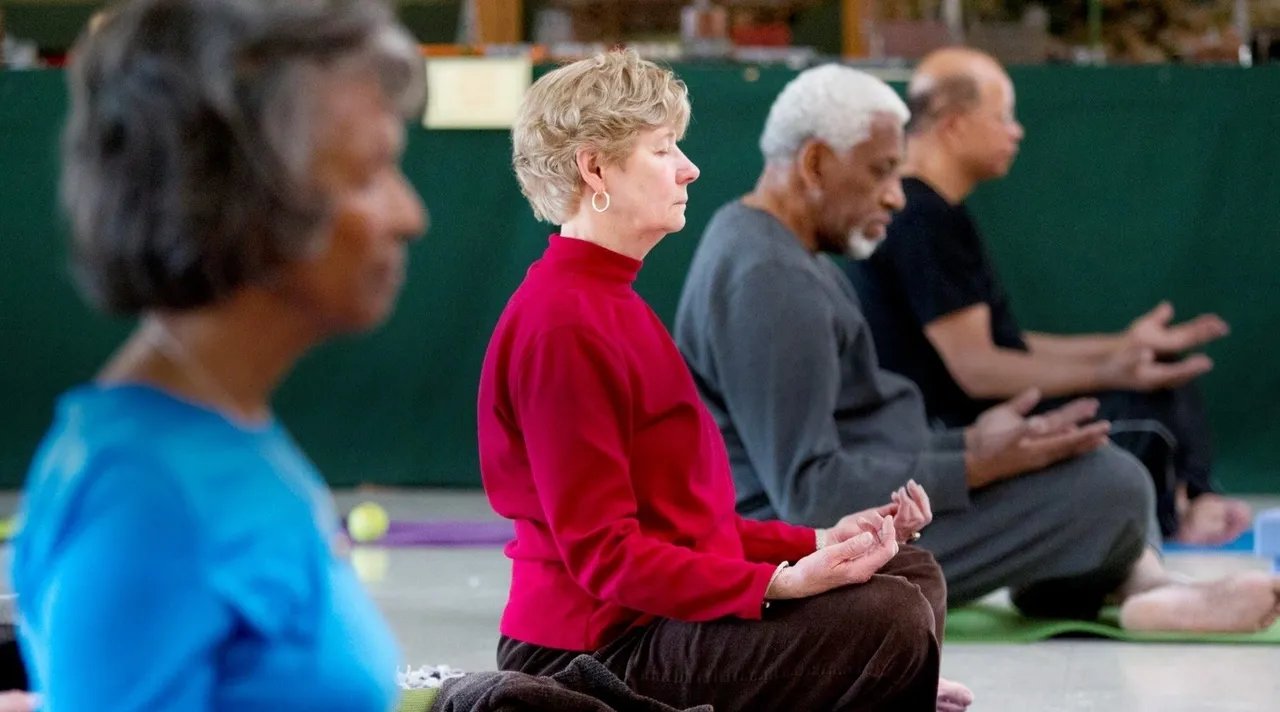
How Seniors Can Handle Common Health Care Challenges
November 9th, 2022aging in place, Alzheimer's Care, Caregiver Employment, Caregiver job, Caregiver Service, Companion Caregiver, Dementia Care, Elderly Care, Fall Activities for Seniors, Hire CNA, Hire HHA, Hire PCA, Home Healthcare, In Home Care, Long Term Care, Outdoor Activities for Seniors, Polish Care Services, Senior Care Services, Spring Activities, Summer Activities for Seniors,
According to statistics, senior citizens use medical services far more frequently than younger people. Unfortunately, though, senior citizens often face major challenges as they navigate the health care system. Medical errors, inaccessible providers, and high costs of care are just a few of the most common problems. Seniors who want to address these challenges can do so through self-advocacy and education. Here are some tips from Polish Care Services to get you started!
Be Your Own Biggest Advocate
Self-advocacy is an important skill for every person, and it’s even more vital for seniors who are seeking medical care. You may hesitate to question a doctor’s opinion or feel timid about asking questions, but these are important steps to take toward handling your health care. If you struggle to advocate for yourself during medical appointments, consider asking a friend or family member to come with you to your next appointment.
Other ways that you can advocate for your health include reviewing your medical bills for errors, familiarizing yourself with your health insurance benefits, and maintaining your own copies of medical records. If you decide to keep your own records, you should ensure that you have copies of medical images, too, such as x-rays. You can keep all of these images in one file by uploading them with a free online tool, combining them, and downloading the file.
Remember that self-advocacy sometimes means that you must hold yourself accountable, too. It’s easy to get overwhelmed with work and feel as though you have no time to invest in physical activity. It doesn’t take much effort to commit to small changes, though, such as walking during a lunch break or taking the stairs rather than the elevator.
Consider All of Your Options
Seniors should never settle for subpar care. You may be tempted to do this, though, if you’ve been seeing the same medical provider for a while or if switching seems like it would be too much trouble. If you’re unsatisfied with the treatment you’re receiving, you need to consider whether it’s time to seek out a different doctor. Having a positive relationship with your health care provider can correlate to better health outcomes, so it’s worth investigating.
In other cases, you may not want to switch providers, but perhaps you do want to seek out a second opinion. Doing so is an effective way to advocate for your health and ensure that you are making informed decisions. To pursue a second opinion, ask your current provider for a referral, or simply search online for other doctors in your area.
As you’re wading through the challenges of the medical system, consider whether managing your own care is the best option. In some cases, it isn’t, and a senior living facility can alleviate the stress surrounding medical care.
Something else to consider: as you’ve probably already realized, these matters can be extremely complex, and jostling a great deal of paperwork and medical records can quickly become rather confusing. To keep things a bit more manageable, try combining your files whenever possible. If you’re not super tech-savvy, this is how you can add additional pages to your PDF with ease.
Seniors Can Care for Their Health Through Self-Advocacy
Despite a lifetime of experience and knowledge, it can still be difficult for seniors to advocate for themselves. It’s essential to do so when dealing with health care, though. Seniors can make progress towards self-advocacy and protect their health by maintaining their own medical records and investing in physical activity.
Polish Care Services provides a high quality of service, compassion and professionalism for cleaning, and caregivers that will meet or exceed expectations. Call 860-255-8278.
Credit: June Duncan

Strong Habits for Retirement Health and Happiness
October 25th, 2022aging in place, Alzheimer's Care, Caregiver Employment, Caregiver job, Caregiver Service, Companion Caregiver, Dementia Care, Elderly Care, Hire CNA, Hire HHA, Hire PCA, House Cleaning, In Home Care, Long Term Care, Outdoor Activities for Seniors, Polish Care Services, Retirement Plans for Seniors, Senior Care Services, Spring Activities, Summer Activities for Seniors, Uncategorized,
Want to know the secret to happy, healthy aging? It doesn’t involve restrictive dieting or a fastidious fitness plan. Taking control of your physical and mental health is surprisingly simple! Move your body in different ways, keep your mind active, create a living environment that reflects your lifestyle goals, and strive to eat a healthy, balanced diet.
Aging well isn’t about all-or-nothing wellness routines. It’s about the small steps you take every day towards overall improvements in your quality of life. Below, we share some tips to help you take control of your whole-body health!
Want to maintain your independence? The team at Polish Care Services provides high-quality home care and cleaning services so you can live safely and comfortably at home!
Consider Starting a Business
Having a sense of purpose is essential for a happy retirement. It’s easy to feel like life is a little meaningless after leaving a long-term job, but it doesn’t have to be this way. You just have to find new ways to fill your life with meaning! Starting a business is a great way to find fulfillment in retirement. And thanks to technology, launching a business has never been easier. There are countless resources online that can help you navigate the steps ahead, like registering your business and filing a DBA name. A DBA (doing business as) name will allow you to operate a sole proprietorship under a fictitious name rather than using your personal name.
Stay Mobile for Quality of Life
As people age, they often face difficulties with mobility. This can make everyday activities like getting out of bed, going to the bathroom, and even taking a walk around the block seem impossible. For many seniors, this loss of mobility can lead to a decline in their overall quality of life. However, there are a number of mobility products that can help seniors stay active and independent. For example, grab bars and bath chairs can provide support and stability when bathing. Walkers and canes can help with balance and stability when walking. And scooters and power chairs can help with transportation. By using these products, seniors can maintain their independence and improve their quality of life.
Try New Hobbies
Learning new hobbies is another great way to keep yourself busy in retirement while challenging your mind. Now is your chance to try out all of those hobbies you never had time for when you had a full-time job! Plus, studies have shown that maintaining hobbies in retirement can have a number of benefits for older adults. These include everything from increased mental stimulation to improved physical health. Social activities can also help combat feelings of isolation and loneliness, which are common among retirees. So whether you’re interested in learning a new language or taking up an instrument, make sure to take advantage of your newfound free time by finding hobbies that you enjoy.
Engage in Different Types of Exercise
One form of exercise may not be enough to support your whole-body health. Seniors—and people of any age, for that matter—can benefit from four main types of exercise. Try to fit all four of these exercise types into your regular fitness routine so you can maintain your strength, endurance, flexibility, and balance:
● Strength training will strengthen your muscles, boost your metabolism, and support your bone health.
● Endurance exercises increase your heart rate to support your cardio and respiratory health.
● Flexibility exercises will protect your mobility by keeping your muscles and joints flexible and strong.
● Balance exercises can help to reduce your fall risk and help you live a more independent life.
Be Mindful of Your Diet
Diet also plays an important role in senior wellness. Try to be mindful about what you’re putting into your body and make choices that will help you avoid issues with malnutrition, a common problem among older adults. Due to age-related changes, you might need to adjust your diet to ensure you get all the vitamins and minerals you need. Try to get most of your calories from nutrient-rich food like fruits and vegetables, beans, nuts and seeds, whole grains, and lean protein.
Adopting healthy habits is the key to getting the most out of your golden years. When you strive for a healthy lifestyle, you’ll feel happier, think more clearly, and have more energy. You could start a business to put your skills to use, focus on making sure you stay mobile, try new hobbies, eat healthy and vary your exercise routines. All of these and more pave the way for better living and overall wellness in this new chapter.
Credit: June Duncan
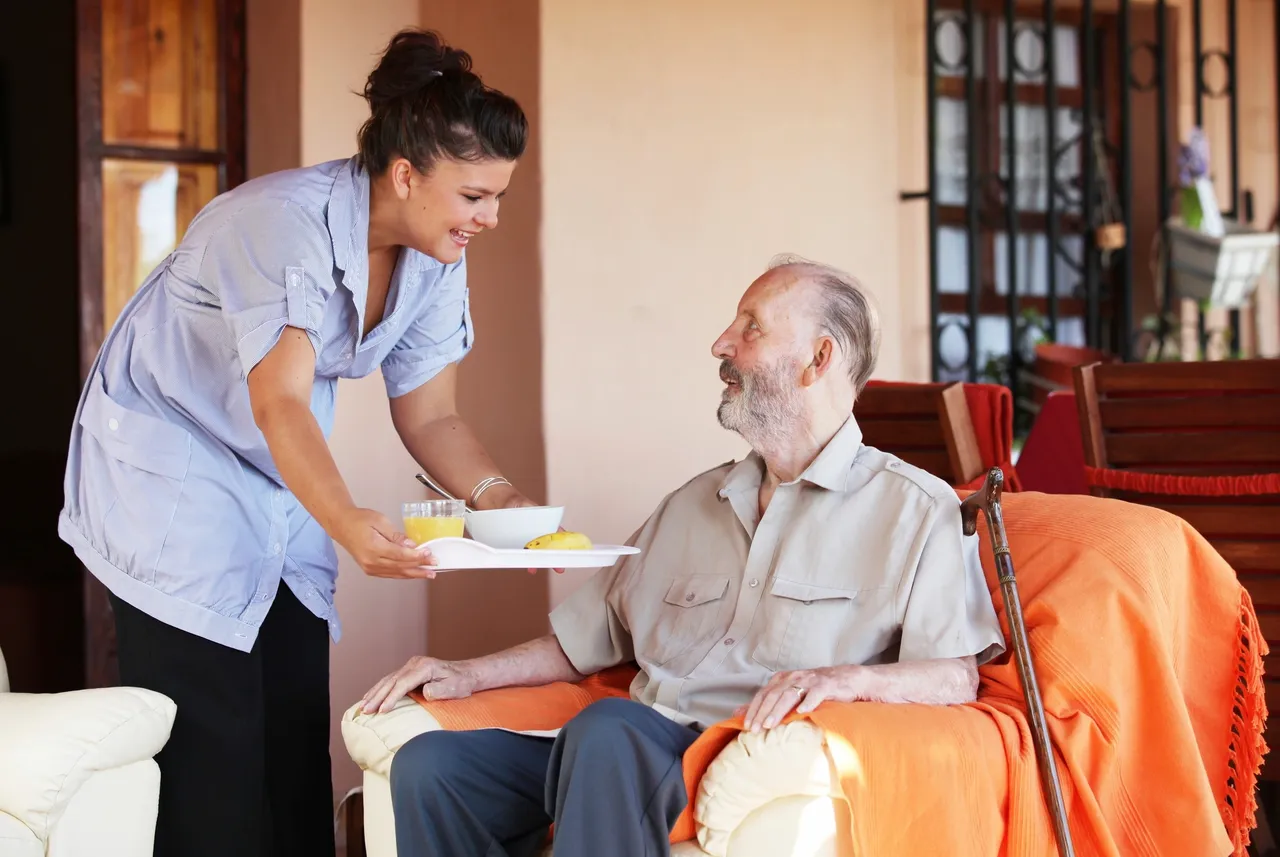
The Benefits of Becoming a Professional Caregiver
March 31st, 2022aging in place, Alzheimer's Care, Caregiver Employment, Caregiver job, Caregiver Service, Companion Caregiver, Dementia Care, Elderly Care, Hire CNA, Hire HHA, Hire PCA, Home Healthcare, In Home Care, Long Term Care, Polish Care Services, Senior Care Services, Spring Activities, Summer Activities for Seniors, Uncategorized,
The number of older adults over 65 is expected to grow in the next two decades to 80 million by 2040. Many seniors will need the assistance of professional caregivers as they age. So, what are the benefits of becoming a caregiver? This post outlines the benefits of being a caregiver for the elderly, what hourly and live-in caregivers do, and why becoming a caregiver is rewarding.
Why Become a Caregiver?
Getting older isn’t easy. At a certain point, simple tasks such as getting up and downstairs, getting dressed, and even preparing meals can be hard for older people to do. A professional caregiver helps to make life easier for their senior clients by helping them with those tasks. The caregiver and client might work together over many years and form a close and rewarding professional relationship.
What is Hourly Care?
Hourly care is just what it sounds like. Caregivers for the elderly are paid hourly to take care of clients. Working on an hourly basis can provide caregivers with a certain amount of flexibility, depending on how their schedule is structured and how many clients they might see on a given day. Some caregivers may work a full 8-hour shift with one client, while others may split their time between a few different clients throughout the day. Some clients might need a caregiver’s help every day for a set number of hours, while others need assistance for a few hours on set days.
What is Live-In Care?
Live-In caregivers will spend their time living with and caring for one specific client. They live in the home with the client and will generally perform any task from activities of daily living (ADLs) to meal prep, errand-running, and homemaking services. As part of their compensation, live-in caregivers receive room and board as well as meals to provide care to their clients. Typically, live-in caregivers can receive at least one day off if desired, and they can sleep a regular number of hours during the night. The specifics of a live-in care arrangement are worked out between the caregiving agency and the family.
Benefits Associated with Being a Caregiver
Professional caregivers can largely determine the number of hours that they want to work. If they prefer the routine that comes with working for one client, they can choose to do that. Other caregivers might prefer working with multiple clients throughout the day or working overnight. Caregivers also get to decide whether they would like to work full-time, part-time, or overtime, which is not available to people who are traditionally employed.
Caregivers can be pooled from various backgrounds and professions than certified nurses assistant (CNA), home health aide (HHA), personal care attendants (PCA). Caregiver agencies hires those trained in other fields such as customer service, civil servants, teachers, nurses, doctors and provide tools for development as a caregiver.
Caregiving agencies offer various benefits for caregiver jobs. Ongoing training for caregivers is one. Continuous training programs allow caregivers to improve their caregiving techniques and learn new ways of providing care to clients. They can also offer job benefits like W2 matching for Medicare and Social Security, overtime, and bonuses for certain jobs.
To learn more about how to become a caregiver for seniors in the Farmington, CT and other Connecticut towns, reach out to Polish Care Services today!

Spring Forward with These Activities for Seniors
March 17th, 2022aging in place, Alzheimer's Care, Caregiver job, Caregiver Service, Companion Caregiver, Dementia Care, Elderly Care, Home Healthcare, In Home Care, Long Term Care, Outdoor Activities for Seniors, Polish Care Services, Polish Care Services Trademark, Retirement Plans for Seniors, Senior Care Services, Spring Activities, Summer Activities for Seniors, Uncategorized,
As we move forward one hour in time, it’s yet another reminder that spring is just around the corner. With warmer days full of sunshine ahead, it’s time to start thinking about spring activities for seniors to do. The winter months can be especially hard on older adults because cold weather forces them to stay inside, which can impact mental health and overall wellbeing. Here are some activities seniors can try that will support both.
Feed the Ducks
A simple activity like feeding the ducks is one way for older adults to get outside and enjoy the warmer weather. It allows them to interact with the ducks and be in nature among the trees and in the fresh air. It’s common to feed ducks with bread. But foods like oats, grapes cut in half, rice, or seeds are healthier options.
Dine Al Fresco
Outdoor dining has become a preferred dining experience since the pandemic began. But it’s also the perfect way to embrace springtime. Set up lunch outside on a patio or in a park. Dinner is also an option. If it’s a little too chilly for outdoor dining, consider getting an outdoor heater or going to a restaurant that has heaters for their outdoor diners.
Have a Garage Sale
Get a jump on spring-cleaning by having a garage sale. Sorting through and getting rid of things can be hard for some seniors. But it’s also an opportunity to take a trip down memory lane and rediscover lost treasures. Organize items into a sale, donate, and keep pile. Then set up a time to have the garage sale. It will take a little work. Once it’s done, though, your loved one can sit outside and meet other people in the neighborhood. It’s mutually beneficial for everyone!
Hang a Bird Feeder
Like feeding the ducks, hanging a bird feeder is a simple activity that can bring seniors a lot of joy. They can watch for the birds while in the yard and take satisfaction in knowing that they are helping the birds. It gives the birds a source of food. During nesting season, birds who have babies won’t have to fly too far from the nest to eat.
Plant an Indoor Garden
An indoor garden is one way to bring nature inside and keep plants safe while temperatures outside are warming up. Try starting a herb garden. Kits are available online or at your local garden store, making doing so easy. Other ideas include growing a few flower plants. If maintaining plants is an issue, consider getting low-maintenance ones such as a succulent or two. This is a great idea if gardening outdoors or spending time outdoors is more difficult for an older loved one.
Decorate for Easter and Spring
Nothing says spring more than decorating around the house. Create spring-themed coloring pages. They can be purchased at a craft store or downloaded and printed at home. Color them in and hang them around the house. Put up removable wall decals for Easter. They are easy to hang and remove when the time comes, especially for seniors in long-term care. Go pick a few wildflowers and make little bouquets to use around the house. Decorating can help put your loved ones in a new mindset and help them shake off the difficulties of winter.
Spring is a time for fresh starts. If you’re looking for companion care for seniors in the Farmington, CT area, reach out to Polish Care Services today!

Aging in Place: 7 Solutions for Seniors Safety
November 17th, 2021aging in place, Alzheimer's Care, Caregiver Employment, Caregiver job, Caregiver Service, Companion Caregiver, Dementia Care, Elderly Care, Fall Activities for Seniors, Hire CNA, Hire HHA, Hire PCA, Home Healthcare, House Cleaning, In Home Care, Long Term Care, Outdoor Activities for Seniors, Polish Care Services, Retirement Plans for Seniors, Senior Care Services, Spring Activities, Summer Activities for Seniors, Uncategorized,
It’s hard to watch your parents age when you’re not nearby to help out, but there’s a lot family members can do to keep seniors safety even when they can’t be there themselves. From installing technology to hiring professional help, here are seven ways you can ensure your loved one is cared for every day.
1. Motion-Activated Lighting
Finding their way through a dark house at night leaves seniors vulnerable to falls, which can hold grave consequences for the elderly. Even when it’s not dangerous, walking across the room to switch a light on or off is burdensome for people with mobility limitations. Replacing light switches with motion-activated lighting ensures a senior’s path is always illuminated. If automated lighting is out of the budget, add LED nightlights in essential areas and replace toggle switches with arthritis-friendly rocker switches.
2. Medical Alert Devices
For seniors who live independently, falling at home poses a life-threatening risk. Medical alert systems get emergency services to seniors in need as quickly as possible. While some devices require the user to activate the alert, the best ones automatically detect a fall and contact emergency services on the wearer’s behalf.
3. Video Chat
While phone calls are a great way to stay in touch, video chatting adds a level of connection that voice alone can’t. An easy-to-use smartphone or tablet with a camera lets the elderly converse face-to-face with family members and caregivers. In turn, those people have an opportunity to visually assess a senior’s wellbeing, rather than relying on self-reporting alone.
4. Automated Pill Dispensers
According to the Kaiser Family Foundation, the average adult over 65 fills more than 20 prescriptions every year. While some of those are short-term prescriptions, many are intended for long-term use. Keeping up with a heavy medication regimen is challenging for anyone, but especially for seniors safety whose cognitive abilities are changing with age. The best way to ensure medications are taken as intended, and to prevent prescription drug misuse, is to use automated pill dispensers that remind seniors when each medication is due.
5. eHealth Tools
Sometimes, a senior’s long list of medications includes drugs that are contraindicated or multiple prescriptions treating the same condition. This happens when doctors aren’t fully informed about a patient’s medical history, and it can lead to a potentially fatal drug interaction. Rather than typing up a new medication list every time a dose changes, seniors can store drug details, test results, and more all in one place using a personal health record app. HealthIT.govoffers recommendations on PHR apps worth trying.
6. Home Security
Whether you’re worried about a senior citizen with Alzheimer’s disease wandering away from home or a stranger breaking in, a home security adds peace of mind when you’re not around to keep an eye on the senior in your care.
7. In-Home Help
Despite advancements in technology, sometimes there’s just no substitute for human touch. Hiring in-home services to help with housekeeping, cooking, and other daily requirements reassures family that their loved one’s needs are being met. For seniors who need basic assistance and want to remain at home, these services are an attractive option. And, depending on the amount of care required, they can be a more affordable option as well. For example, in Washington D.C., a resident could spend $3,000 on care services and $2,787 on their mortgage, and still spend less than the $5,933 it would take to live in an assisted living facility.
According to the Department of Housing and Urban Development, the vast majority of American seniors safety want to age in place rather than moving to a care facility. However, preserving independence means acknowledging and accommodating the changes that come with age. While there’s no catch-all solution that will work for everyone, these seven ideas are a big step toward keeping seniors safe at home.
Author June Duncan for Polish Care Services
#in-home help technology #home security #alzheimers #ehealthmedical alert devices #Senior Services #senior safety #senior health #solutions for senior safety #aging in place
